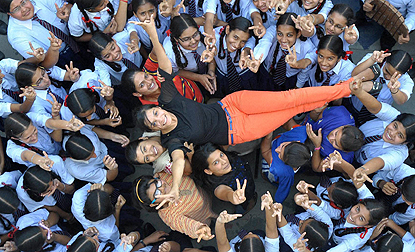New Delhi, May 29: Girls have fared much better than boys in this year's CBSE class XII examinations, where the overall pass percentage stood at 82.66 per cent.
 The pass percentage of girls stood at 88.52 as compared to 78.27 per cent for boys.
The pass percentage of girls stood at 88.52 as compared to 78.27 per cent for boys.
Thiruvananthapuram Region registered the best results among all the regions, posting a pass percentage of 94.26, said CBSE in a statement, after the results for the Delhi and the Dehradun regions were declared today.
The pass percentage across the country stood at 82.66 per cent, slightly higher than what it had registered last year with 82.10 per cent.
In total 10,28,928 candidates had registered for class XII examination this year.
The results of Chennai and Thiruvananthapuram regions were declared on May 26, and the results of Ajmer, Allahabad, Bhubaneshwar, Guwahati, Panchkula and Patna regions were declared yesterday.






Comments
Add new comment